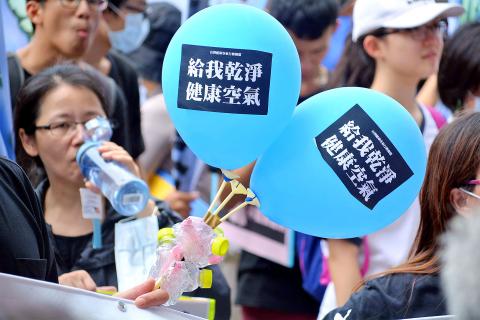Thousands of protesters yesterday rallied in Changhua against Formosa Chemicals and Fibre Corp, saying that its coal-fired power plant in the city causes serious air pollution.
About 3,000 people, some wearing shackles and chains, marched across the city to the front of the Changhua County Hall, demanding that the county government reject the company’s license renewal application and shut its coal-fired power plant ahead of the Sept. 28 renewal deadline.
The Changhua County Council in July passed a bylaw to enforce more stringent emissions standards to improve air quality by effectively banning petroleum coke and bituminous coal.

Photo: CNA
The company’s power plant, which uses bituminous coal, accounts for about 60 percent of the county’s coal consumption.
The Changhua County Government has repeatedly rejected the company’s license renewal applications, and organizers of the rally said they wanted to press the county government to stand firm on its pollution reduction policies.
Organizers said a signature collection campaign launched on Sept. 10 had collected more than 10,000 signatures, and it would be continued until Sept. 28.
Taiwan Healthy Air Action Alliance convener Yeh Guang-peng (葉光芃) said the number of people who took part in the rally highlights the seriousness of air pollution in the county.
Politicians across party lines showed up to give their support, including New Power Party legislators Hsu Yung-ming (徐永明) and Hung Tzu-yung (洪慈庸), Democratic Progressive Party (DPP) Legislator Chen Su-yueh (陳素月) and former Chinese Nationalist Party (KMT) legislator Chen Chieh (陳杰).
“The company has filed a renewal application 28 times, and the county government rejected it 28 times. The county government will commission legal and environmental experts to review the application when the company files it again,” said Changhua County Commissioner Wei Ming-ku (魏明谷), a DPP member.
The rally was largely peaceful, although there was a scuffle with police after Wei returned to the county hall.
He did not directly respond to protesters’ demands, but again explained the county government’s review process.
The county government later issued a statement saying it plans to remove the company’s facility from the city to make the city coal-free, as the county’s PM2.5 levels — fine particulate matter smaller than 2.5 micrometers — have exceeded the legal limit.
The county government reiterated that it has the most stringent emission standards in the nation, saying it would review Formosa Chemicals and Fibre Corp’s renewal application according to those standards.
The firm issued a statement saying industrial emissions are not the major source of PM2.5 in the county, and that traffic emissions and pollution from other cities and counties has a more significant affect.
Formosa Chemicals and Fibre Corp said it has invested billions of New Taiwan dollars in pollution prevention measures and its emissions are in accordance with national standards.
Nearly 1,000 company employees, all of them Changhua residents, would lose their jobs if the county rejects the company’s renewal application again, the firm said, calling on the county to renew its operating permit.

A strong continental cold air mass is to bring pollutants to Taiwan from tomorrow, the Ministry of Environment said today, as it issued an “orange” air quality alert for most of the country. All of Taiwan except for Hualien and Taitung counties is to be under an “orange” air quality alert tomorrow, indicating air quality that is unhealthy for sensitive groups. In China, areas from Shandong to Shanghai have been enveloped in haze since Saturday, the ministry said in a news release. Yesterday, hourly concentrations of PM2.5 in these areas ranged from 65 to 160 micrograms per cubic meter (mg/m³), and pollutants were

Taiwan’s armed forces have established response protocols for a wide range of sudden contingencies, including the “Wan Chun Plan” to protect the head of state, the Ministry of Defense (MND) said today. After US President Donald Trump on Saturday launched a series of airstrikes in Venezuela and kidnapped Venezuelan President Nicolas Maduro, concerns have been raised as to whether China would launch a similar “decapitation strike” on Taiwan. The armed forces regularly coordinate with relevant agencies and practice drills to ensure preparedness for a wide range of scenarios, Vice Minister of National Defense Hsu Szu-chien (徐斯儉) told reporters before a

EVA Airways on Saturday said that it had suspended a pilot and opened an investigation after he allegedly lost his temper and punched the first officer several times as their plane was taxiing before takeoff at Los Angeles International Airport. According to a report published on Thursday by The Reporter, the incident occurred after the flight’s Malaysian first officer tried to warn the Taiwanese pilot, surnamed Wen (文), that he was taxiing faster than the speed limit of 30 knots (55.6kph). After alerting the pilot several times without response, the first officer manually applied the brakes in accordance with standard operating

NOT AN OPENING: Trump’s violation of international law does not affect China’s consideration in attacking Taiwan; Beijing lacks capability, not precedent, an official said Taiwanese officials see the US’ capture of the president of Venezuela as a powerful deterrent to Beijing’s aggression and a timely reminder of the US’ ability to defeat militaries equipped with Chinese-made weapons. The strikes that toppled Venezuelan President Nicolas Maduro signaled to authoritarian leaders, including Chinese President Xi Jinping (習近平), US President Donald Trump’s willingness to use military might for international affairs core to US interests, one senior official in Taipei’s security circle said. That reassured Taiwan, the person said. Taipei has also dismissed the idea that Trump’s apparent violation of international law could embolden Beijing, said the official, who was not